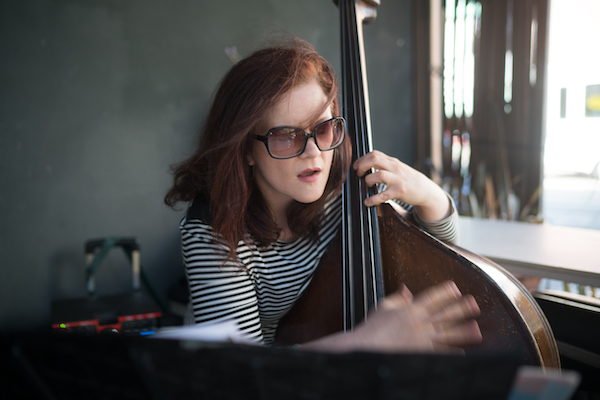Jan 13, 2026 2:09 PM
More Trump-Kennedy Center Cancellations
The fallout from the renaming of the John F. Kennedy Center for the Performing Arts to include President Donald…

Lisa Mezzacappa draws inspiration from author Italo Calvino for her new album, Cosmicomics.
(Photo: Eric Vogler)Lisa Mezzacappa doesn’t have to go looking for inspiration. It seems that inspiration finds her, thanks to an artistic curiosity that prompts her to constantly read books, watch films and listen to albums.
“I have all these ideas in my mind,” the bassist said from her Bay Area home. “At the same time, I’m thinking of the people in my ensembles and what I might write for them. Something comes along and sticks in my mind, and I can’t get rid of it until I turn it into music. I’ve been lucky that I’ve been able to connect those ideas to the musicians I’m writing for.”
Her latest album, Cosmicomics, takes its title and sensibility from a collection of short stories of the same name by fiction writer Italo Calvino. Mezzacappa relied on her instrumental sextet to conjure up the author’s alternate worlds.
On “The Distance Of The Moon,” for example, Calvino imagines a time when the moon came so close to Earth that one could row out on the sea and climb a ladder to the lunar landscape. On Mezzacappa’s song of the same title, her muscular bass lines evoke the effort to stand a ladder upright in a boat; John Finkbeiner’s shimmering guitar chords suggest the no man’s land between the two fields of gravity, while Aaron Bennett’s tenor saxophone solo implies a scamper across the moon’s craters.
“Lisa usually tells us the story at some point, and that influences my playing.” Bennett said. “I don’t have to read the material, because I feel I get enough information from Lisa. In fact, I feel I get more from hearing her interpretation, feeding off her excitement.”
As an avant-garde artist who has worked with large ensembles and choreographers, Mezzacappa is accustomed to creating ambitious projects without the support of a major record label. She is comfortable with the notion that certain works might not ever yield a profit. Fortunately, the Bay Area is filled with talented musicians who are in the same boat she is, and they’re willing to help her, just as she’s willing to help them.
“My projects take a long time to incubate. For [the multimedia production] Glorious Ravage, I applied for about 30 grants and got six of them—and that’s a good percentage,” she said. “I started fundraising in 2012; we premiered it in 2015, and the recording came out in 2017. Fortunately, I’m a good organizer. ... I try to make the finances as good as I can for my musicians, but it’s never what they deserve. What you hear on my records is the generosity of these amazing talents.”
Finances are harder than ever now, due to the pandemic. From her home, Mezzacappa has been working part-time jobs for local nonprofits and teaching lessons via video conferencing. And she has continued applying for grants to fund new projects. “I’ve been brooding a lot about the future,” she said. “What venues will be able to afford to have live music after this? ... Who will be threatened with homelessness and hunger—and how will we help them?” DB
This story originally was published in the July 2020 issue of DownBeat. Subscribe here.

Belá Fleck during an interview with Fredrika Whitfield on CNN.
Jan 13, 2026 2:09 PM
The fallout from the renaming of the John F. Kennedy Center for the Performing Arts to include President Donald…

Peplowski first came to prominence in legacy swing bands, including the final iteration of the Benny Goodman Orchestra, before beginning a solo career in the late 1980s.
Feb 3, 2026 12:10 AM
Ken Peplowski, a clarinetist and tenor saxophonist who straddled the worlds of traditional and modern jazz, died Feb. 2…

The success of Oregon’s first album, 1971’s Music Of Another Present Era, allowed Towner to establish a solo career.
Jan 19, 2026 5:02 PM
Ralph Towner, a guitarist and composer who blended multiple genres, including jazz — and throughout them all remained…

Rico’s Anti-Microbial Instrument Swab
Jan 19, 2026 2:48 PM
With this year’s NAMM Show right around the corner, we can look forward to plenty of new and innovative instruments…

Richie Beirach was particularly renowned for his approach to chromatic harmony, which he used to improvise reharmonizations of originals and standards.
Jan 27, 2026 11:19 AM
Richie Beirach, a pianist and composer who channeled a knowledge of modern classical music into his jazz practice,…